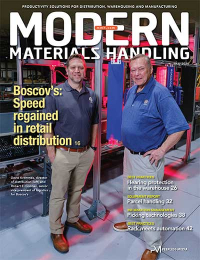GS1 US guideline helps pharmaceutical industry prepare for item-level traceability requirement
Drug Supply Chain Security Act (DSCSA) serialization and item-level traceability requirements set to take effect in 2017 and 2023.
Latest Material Handling News
Warehouse technology company Synergy Logistics promotes Brian Kirst to Chief Commercial Officer Seegrid names Abe Ghabra as Chief Operating Officer GRI appoints Ydo Doornbos as its director for North America ISM May Semiannual Report signals growth in 2024, at a reduced rate 11th annual National Forklift Safety Day to be hybrid event, on June 11 More NewsGS1 US has published a new release of the guideline, Applying GS1 Standards for DSCSA and Traceability (R1.2), to help the pharmaceutical industry prepare for Drug Supply Chain Security Act (DSCSA) serialization and item-level traceability requirements in 2017 and 2023.
The new release builds upon version 1.1 of the guideline and takes advantage of new features in the GS1 Electronic Product Code Information Service (EPCIS) and Core Business Vocabulary (CBV), GS1 Standards that enable trading partners to share information about the physical movement and status of products as they travel throughout the supply chain – from business to business and ultimately to consumers.
EPCIS enables supply chain partners to capture and exchange information about supply chain events (e.g., packing, shipping, receiving, dispensing, etc.) using a standard format. The U.S. Food and Drug Administration selected EPCIS as a method that can be used to comply with DSCSA data exchange requirements. As a GS1 data sharing standard, EPCIS provides the data attributes and message structure needed for the information handling and retrieval provisions of the DSCSA law.
“As industry completes its preparations to go live with DSCSA serialization requirements for 2017, pharmaceutical companies are increasingly focusing on the journey to DSCSA item-level traceability, which must be in place by 2023,” said Greg Bylo, vice president of healthcare, GS1 US. “The new release of the guideline provides the tools they need to plan, pilot and implement an EPCIS-based approach to address those requirements and supports the main goals of DSCSA—increased transparency and security in the pharmaceutical supply chain.”
The guideline is being published in the new GS1 US DSCSA Implementation Suite, which also includes three reference documents containing additional guidance on business process applications. It was developed through the commitment and dedication of the GS1 Healthcare US® Secure Supply Chain Workgroup, where leading manufacturers, wholesalers, retail pharmacies, healthcare providers, government agencies and industry associations worked together to examine how GS1 Standards can best be applied to support DSCSA and traceability. Based on their work, the new release of the guideline updates the EPCIS traceability event specifications based on the latest release of EPCIS and CBV standards, which were ratified in September 2016. Their work also produced updated and expanded supply chain choreographies and exception scenarios (including detailed diagrams, flowcharts and XML examples) to show industry members how to apply and use the standards in business processes.
GS1 US has stated it will continue working with industry to extend the guideline to support management of historical and transactional data, contract manufacturing, repackaging, exception processing, as well as lot- and item-level data management through the transition period. For more information and resources visit www.gs1us.org/dscsa.

Article Topics
Latest in Materials Handling
Warehouse technology company Synergy Logistics promotes Brian Kirst to Chief Commercial Officer Seegrid names Abe Ghabra as Chief Operating Officer GRI appoints Ydo Doornbos as its director for North America ISM May Semiannual Report signals growth in 2024, at a reduced rate 11th annual National Forklift Safety Day to be hybrid event, on June 11 PAC Machinery announces leadership transition Motion Industries to acquire automation company More Materials HandlingSubscribe to Materials Handling Magazine

Find out what the world's most innovative companies are doing to improve productivity in their plants and distribution centers.
Start your FREE subscription today.
May 2024 Modern Materials Handling

Latest Resources










